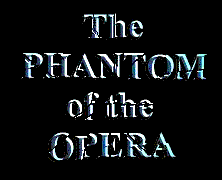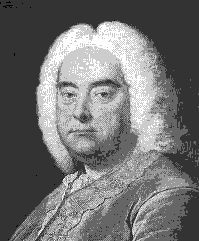|
|
Fall 1999 |
|
HOPEFULLY, I will update this site every month and put some interesting information about music or composers that we are studying, or something about current events in music that might relate to us, or who knows what! If you have ideas for me, let me know! |
||
|
||
and MUSIC FOR THE ROYAL FIREWORKS |
||
|
In Concert Band, we are playing the minuet from Handle's Music for the Royal Fireworks, and in Symphonic Band we are playing selections from the Broadway musical, Phantom of the Opera. Consequently, it seemed reasonable to focus this tidbit on these two works. Both pieces were written with the common audience in mind (rather than the musically intellectual audience). Both were written as music to serve a purpose other than concert performances. Both were written in England. Both are well loved, musical masterpieces. The Phantom of the Opera |
||
|
|
||
|
|
(By the way, have you ever noticed that titles of music & books are usually underlined or in italics?) George Frideric Handel was employed by King George II, the King of England,when he wrote the Music for a Royal Fireworks suite in 1749. The king had ordered a fireworks display for the people as part of the celebrations & thanksgiving around the Peace of Aix-la-Chapelle. A very large & very complex machine was built in Green Park for the fireworks display. But there was a BIG problem!! The building caught on fire during the fireworks! Luckily for Handel, this all took place after the people enjoyed his new music. His band was playing before the fireworks while the king was making the official inspection. Notice that I did say "band". This music was not originally written for orchestra. While it did include strings, the wind & percussion instruments were the prominent sounds. Handel's original scoring was for winds & percussion only; before the performance he decided to add some strings. It wasn't until later that he rewrote it to fit a more orchestral instrumentation. |
|
Reports say that the traffic on the London Bridge was backed up for three hours & there was no way you could get a carriage across (in those days, they were horse drawn carriages). There were 12,000 people in the audience that day, so Handel would need to have a big group of musicians -- remember, there weren't any amplifiers back then!!
Handel was a baroque composer, born in Halle, Germany, but he spent most of his life working in London, England. He became a naturalized citizen and a British subject in 1727. To learn more about Handel, click on one of the links below.
Did you know?
- Handel is the composer who wrote the Messiah.
- His father wanted him to become a lawyer and thought music wasn't a serious enough profession for George.
- He wrote another well known suite, Water Music. Water Music was written for King George I, for a party the King was having. His royal party was on a barge in the river -- Handel's music group was there, too -- and the people on the shore on either side of the river could enjoy the music and have their own parties.
- The King had Handel repeat the Water Music suite three times - each time took a whole hour!
- Handel and Johann Sebastian Bach were born a month apart, less than 100 miles from each other, each knew of the other & wanted to meet him, but they never met. (Remember, 100 miles is a long way to walk or ride in a horse drawn carriage!)
- Handel went blind when he was 67 years old. From then until he died at 74 years old, he dictated his music to someone else who wrote them down.
Some other links to information about G.F.
Handel
Go to http://bruichladdich.dcs.st-and.ac.uk/HandelWWW/HandelCat.html if you would like to download the midi files for the themes from the Fireworks Music. (The last one, Minuet II, is the one we are playing.) You will also find a massive list of other links.
http://w3.rz-berlin.mpg.de/cmp/handel.html - a biography, pictures & more.
http://www.intr.net/bleissa/handel/home.html - a biography, picture & a lot more information on Handel.
http://www.halle.de/HAENDEL/WWW/HAENDEL.HTM This site is all about Handel, but it is in German!
Email me with other Handel links that you think would be good for middle school kids!
 |
The Story...The Phantom is actually a man, not a ghost. His name is Erik. Erik is a Frenchman (the story takes place in the Paris Opera House) and he was born with an ugly deformity of his face. Back then there wasn't plastic surgery or any other way of making him less ugly, so his parents immediately put a cloth mask over his face to hide it from the world. According to the legend, Erik was a brilliant man and he was an architect. While building the beautiful new opera house in Paris, he also built a large apartment in the maze of rooms and halls underneath the building. Once the Opera House was finished, he began to live in the cellars of the building so that he could disappear from the society that had scorned him because of his deformity. (The Paris Opera House is a real building & it really does have a maze of rooms & hallways in the cellars -- and, it has a huge subterranean lake (subterranean means, below the surface of the earth). It is the largest opera house in the world! The building is so big that it even has a stable for 20 horses in one of the cellars -- the horses are used in major productions on stage. The building is almost 3 acres in size and is 17 stories high - 7 of them are below street level!!! The basements below could house entire sets that were then raised onto the stage for the performance.) Let's go back to Erik. To keep people from discovering him and finding out that he was living in the cellar of the Paris Opera House, he pretended he was a ghost. He made spooky things happen and then demanded that the management of the Opera House never sell Box number 5, so he could use it (the fanciest, best seats are in the box areas). He also demanded an allowance of 20,000 francs a month. As long as his demands were met, he left things alone. But when the new management took over and stopped making the payments & sold the tickets to Box 5, the Phantom reappeared & began to haunt the Opera House. Finally, when he caused the huge chandelier to fall into the audience, the management gave in to his requests. One of his requests is that the new star, Christine Daae, should be the one singing the main role in place of Carlotta. Carlotta refuses & in the middle of a performance, her voice gives out. Why does Erik care who sings? He has secretly been giving Christine voice lessons and through his expert teaching, has transformed her into a magnificent opera singer. At the same time, Erik falls in love with Christine. Can she ever love him, the monster, the Phantom of the Opera?? The Phantom of the Opera story was originally created by a French author, Gaston Leroux. His novel was published in 1911. Leroux decided to write the book after he took a tour of the actual Paris Opera House and went through its lower floors. He was amazed at the maze of hallways and rooms, and the mysterious subterranean lake. And if that wasn't spooky enough to inspire the story, the building of the Opera House was interrupted by the Franco-Prussian war, and during the war, the cellars of the Opera House were used as a prison! The next appearance of The Phantom of the Opera was a silent movie starring Lon Chaney, which came out in 1924. In 1943, The Phantom of the Opera came out in color & sound movie form. Two other movies were made later and there were a couple of stage performances as well. Then Andrew Lloyd Webber and Charles Hart wrote the musical, The Phantom of the Opera. It opened in London in October of 1986. Charles Hart wrote the lyrics (words to the songs) and Andrew Lloyd Webber wrote the music. It is Webber's music that we are playing in band.
Did you know?
|
|

Click here for
an enrichment point possibility!
|
Go back to the past tidbits page. |
|
Visit the Wayland Public Schools site http://www.wayland.k12.ma.us |
|||
|
|||
|
|||
|
|||
|
|||
|
|
|||


